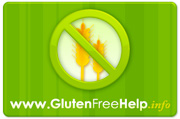In my work as an author, researcher, and gluten-free advocate, I strive to raise awareness for celiac disease and gluten intolerance because I know that with increased awareness will come more research, more correct diagnoses, and perhaps better treatment options. Illustrating this point, studies on the genetic links to celiac disease is leading to more research which may lead to new and more effective ways to treat the disease, an exciting prospect for celiacs who may want to enjoy some gluten now and then.
Celiac disease, an autoimmune disease which is caused by an allergic reaction to gluten, a protein found in wheat, rye, and barley, affects about 1% of the population and 3 million Americans. The disease attacks the villi,the finger-like structure which line the small intestine, leading to stomach troubles and malabsorption of nutrients. Left untreated, it can cause severe health conditions and complications such as anemia, osteoporosis, miscarriage, and even cancer.
David van Heel, a gastrointestinal genetics professor at Barts and The London School of Medicine and Dentistry, headed a group of researchers from around the world who studied the genetic maps of more than 9,400 celiacs.
According to Celiac.com, British researchers have found what they term “substantial” evidence that the genes which are connected with celiac disease are also linked to other autoimmune disease such as rheumatoid arthritis. As a result, scientists are able to understand how the genetic risk factors for the disease operate—by changing the number of immune system genes that cells make. Furthermore, it is now understood that there are “hundreds” of genetic risk factors, which means that scientists should be able to “have a good guess at nearly half of the genetic risk at present,” van Heel wrote in the Nature Genetics journal in his published study.
Why is that only 3% of celiac Americans have been properly diagnosed? It’s likely that they or their doctors haven’t even heard of the disease. Research on celiac disease in the U.S. depends completely on the generosity of benefactors for its funding. Without charitable donations, there would be no way to continue this research and the efforts to raise awareness. Out of the estimated fifty autoimmune diseases that have been discovered by doctors, it is the only one for which research isn’t supported by the U.S. government.
I spent years running in circles with doctors who had no clue as to the cause of my painful symptoms, which finally drove me to research my symptoms on my own. I’m grateful to have been properly diagnosed, but managing the gluten-free diet can be a challenge. The prospect of a pill to offset genetic factors will appeal to many celiacs like myself. Although the treatment for celiac disease is simple, it calls for a lot of work and can be disheartening at times, requiring a total lifestyle change and a lot of homecooking.
With this genetic research in the area of celiac disease, we can look forward to more research, more awareness, and perhaps another treatment option. Meanwhile, it’s best to keep doing our parts to raise awareness and funds for research.
Tina Turbin
k.m.
From our home to yours, Tina Turbin
If you have any questions or suggestions just email me at Info (at) TinaTurbin (dot) com.









That’s so funny that this was just posted because trials have been done of a new drug by Alvine Pharmaceuticals and so far the results seem promising! So who knows? Maybe in the next year or so we really are going to have a new drug out to help celiacs! Of course it’s not a replacement for the gluten free diet; it’s just supposed to help with things like accidental ingestion of gluten and things like that. I would love to have something like that on hand when I’m traveling. It would be a life saver!
It’s true, they’re already testing this new drug and experts seem pretty hopeful about it. I have to say though that I’m not a fan of taking drugs unless you’re really in trouble medically. I think natural remedies, such as enzymes, would be better instead of medication because drugs can have side effects and stay stored in the body and cause other damage later on. I guess this is a really good thing for super sensitive celiacs though.
It may happen sooner than we think, huh? I’m so excited! But I totally agree with @Wendy about not wanting to take drugs. Drugs are no good, they’re not natural, can cause vitamin and mineral and other deficiencies, and they can affect the way you think and feel. Who wants to complicate things by taking a drug regularly? Unless of course you have an emergency of accidental gluten ingestion, then I understand, because that would rare.
I don’t mind taking a drug at all if it will help with my symptoms when I get my food cross-contaminated with gluten. I travel and eat out a LOT and sometimes it seems that on a weekly basis I get gluten when I’m really careful. I might be oversensitive I think, but if I could take this drug as insurance on a business trip that would help so much!
Yeah I have mixed feelings but I don’t suffer anymore from intestinal damage because I’m a stay at home mom and I cook pretty much everything at home so I know that all the food I eat is gluten-free. But if I were to travel or if I was super sensitive I would want something to help. Thankfully I’m not that sensitive but I know people who are. With just a little gluten they’ll get really sick for days and have to miss work/school. So I’m glad there will be a drug like this available to them!
I agree totally that we’re lucky about not having to depend on drugs to treat celiac disease. Drugs can also lead to vitamin deficiencies which defeats the purpose of treating celiac disease anyway, right? I’m pretty certain that natural remedies can help with just about anything and drugs should be reserved for emergency circumstances.
Yeah i heard about the drug testing. I’m looking forward to the drug because I’m highly highly sensitive to just the slightest traces of gluten and I am actually scared to death of eating out. Just knowing about the drug i know will make me feel a lot safer so I can go out to gluten-free-friendly restaurants and feel more comfortable.